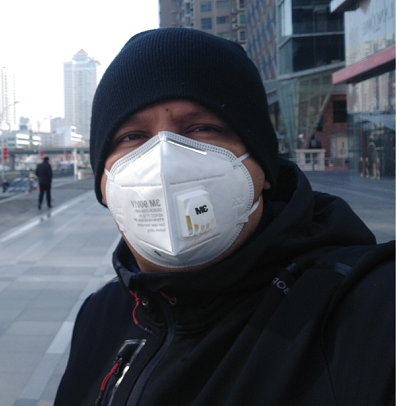The life of African students in Wuhan amid coronavirus epidemic
Wuhan, Feb. 10 (Xinhua) – Amoo Musa Olalekan these days spends time in his dormitory concentrating on writing his thesis being a final year master student at Huazhong Agricultural University in Wuhan, the epicenter of the novel coronavirus outbreak.
“I have stayed in my dorm since the beginning of this outbreak. We are told not to go outside, but I know this is to prevent us from being exposed to the virus,” said the 28-year-old Nigerian majoring in crop breeding and genetics.
Olalekan is among the 3,000 to 4,000 African students in Wuhan, capital of central China’s Hubei Province, which is home to a number of prestigious universities attracting many international students.
Life continues as normal on campus, students say. “During my spare time, I watch movies, chat online with my friends, and also sleep,” Olalekan said. Apart from having dinner in a halal canteen, Olalekan says he likes to cook for himself.
”Since I have some rice, chicken, peppers, tomatoes and a few eggs in the refrigerator, I can cook some basic food to eat. If I use up all the food items, I can go to the supermarket in my school to buy things,” he said.
“But the price has gone up these days, I used to pay 2.9 yuan (41 U.S. cents) for 0.5 kg of tomatoes, which now costs me around 8 yuan.” Olalekan said his university is working hard to keep the students safe on campus. “They have provided us with masks, thermometers, disinfectants and other materials,” he said.
“I am among the volunteers who work with the international office of the university to ensure the safety of the international students in their respective dormitories on a daily basis. We are advised to check our temperature daily and also to maintain good personal hygiene through washing hands regularly as well as maintaining a clean environment,” he said.
“For now, my friends and I are all healthy. We will surely overcome this threat,” Olalekan said.
Huazhong Agricultural University has 442 international students, and 166 of them are currently living on campus. They mainly come from Pakistan, Egypt, Bangladesh, Thailand, Vietnam, and Sudan, according to Wang Zhongjian with the international office of the university.
Obame Mba Seraphin Lary, from Gabon, is a junior student with the Civil Engineering Department of Wuhan University of Technology.”I am fine. I am just in my dormitory and taking care of myself. I watch movies, cook, and sometimes go cycling on the campus,” the 26-year-old said. “I have enough food to last a week. And there are three to four supermarkets near my dorm, I can buy food there whenever I need. The university also provides us with vegetables, including onions, potatoes and tomatoes.”
L’hocine Walid, an Algerian student preparing for his PhD in business administration at Wuhan University of Technology, said they have a WeChat group for communication. The teachers offered us help in case of any problem. The office is always at our disposal to answer all our questions. The university distributed food in addition to some masks and gloves.”
Many international students in Wuhan say they have received care and support from their universities, teachers and friends. Huang Chao, director of the international student office of the School of International Education of Huazhong University of Science and Technology, said the university has 2,025 registered international students, of whom 1,046 are still in Wuhan now.
“The virus came at an unexpected moment. Our embassy proposed to take us back to our country but I decided to stay here in Wuhan. I have been here for many years and Wuhan became my second home. I shared with its people happy moments and I am willing to be with them in this difficult situation,” said L’hocine Walid, a fourth-year student in Wuhan, adding that he has faith in the Chinese government as he knows that they are doing their best to solve the problem.
Hanane Thamik, a Moroccan student in Wuhan University said she decided to stay for many reasons, although many of her compatriots have left.”By staying here, I want to show to those who think badly about China that I’m not afraid of staying with Chinese people. I’m sure that they will take care of me the same as they take care of Chinese citizens.” Thamik said the university provided her free masks, treatment and three meals a day and the teachers cared a lot about her safety.
Having spent eight years in Wuhan, Sadi Makangila Patrick, a doctoral student majoring in English language and literature at Central China Normal University, also chose to stay. When hearing the megacity was locked down to curb the spread of the novel coronavirus, Patrick said he was a bit worried. His family members and friends all sent regards to him from his hometown in the Democratic Republic of the Congo.
However, the bravery demonstrated by the medical workers and volunteers made him feel moved and gave him more confidence.”Wuhan is my second hometown. I believe the epidemic will be brought under control,” he said.



